Behavioral Health and Mental Health Short Answer Questions
VerifiedAdded on 2023/06/10
|5
|937
|380
Homework Assignment
AI Summary
This assignment explores key concepts in behavioral health and mental health, addressing short answer questions on topics such as the differences between mental and behavioral health disorders, and the symptoms a behavioral health provider would assess for each. It defines integrated behavioral health care and outlines the skill sets needed for providers in primary care versus clinical settings. The assignment also contrasts the terms 'patient' and 'client', emphasizing the importance of cultural competency for behavioral health providers and differentiating their roles from those of clinicians and licensed counselors. Finally, it discusses patient outcomes and their impact on the behavioral health provider's role in a medical setting, highlighting how providers can use this information to improve patient care. The assignment includes references to support the answers.
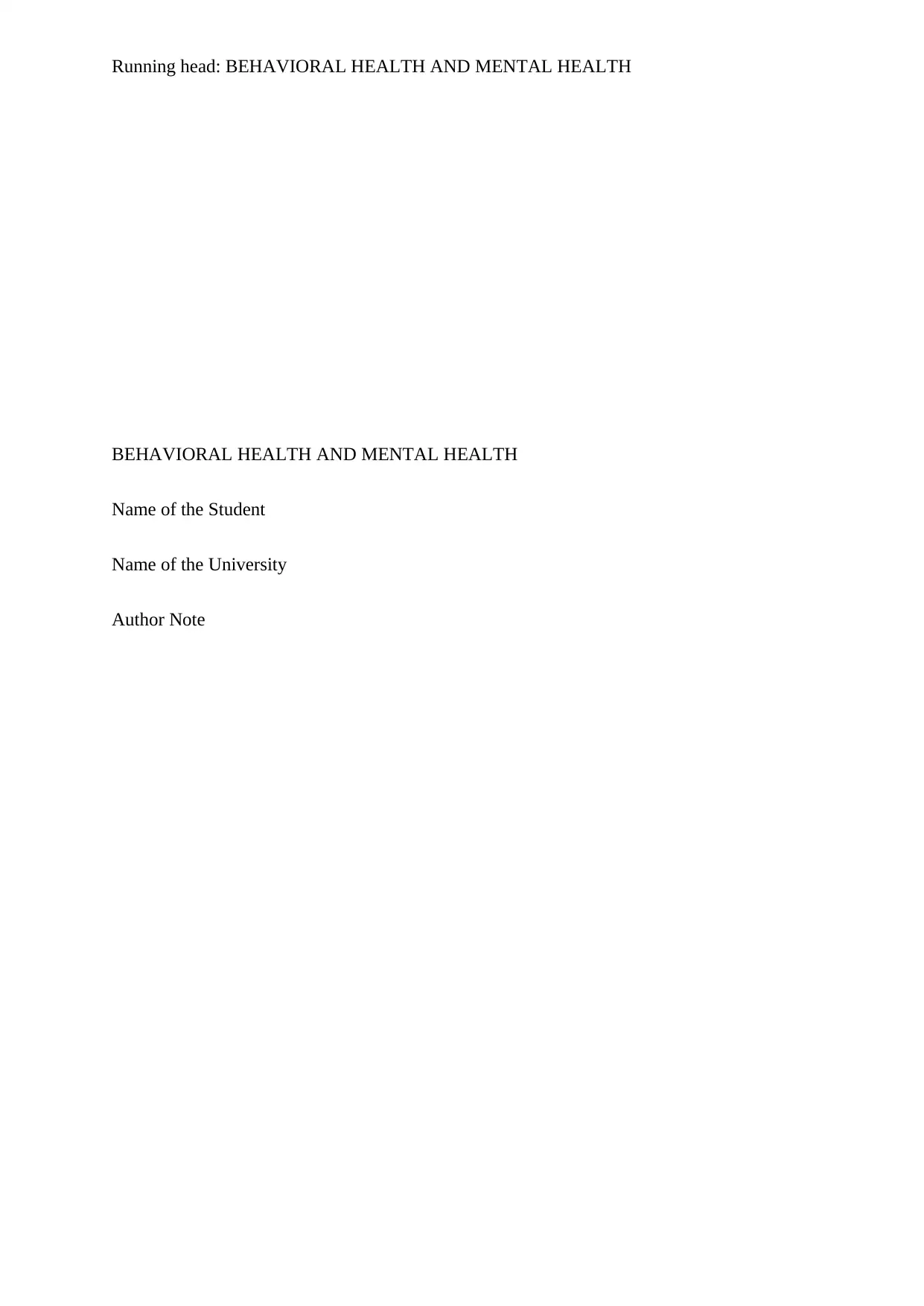
Running head: BEHAVIORAL HEALTH AND MENTAL HEALTH
BEHAVIORAL HEALTH AND MENTAL HEALTH
Name of the Student
Name of the University
Author Note
BEHAVIORAL HEALTH AND MENTAL HEALTH
Name of the Student
Name of the University
Author Note
Paraphrase This Document
Need a fresh take? Get an instant paraphrase of this document with our AI Paraphraser
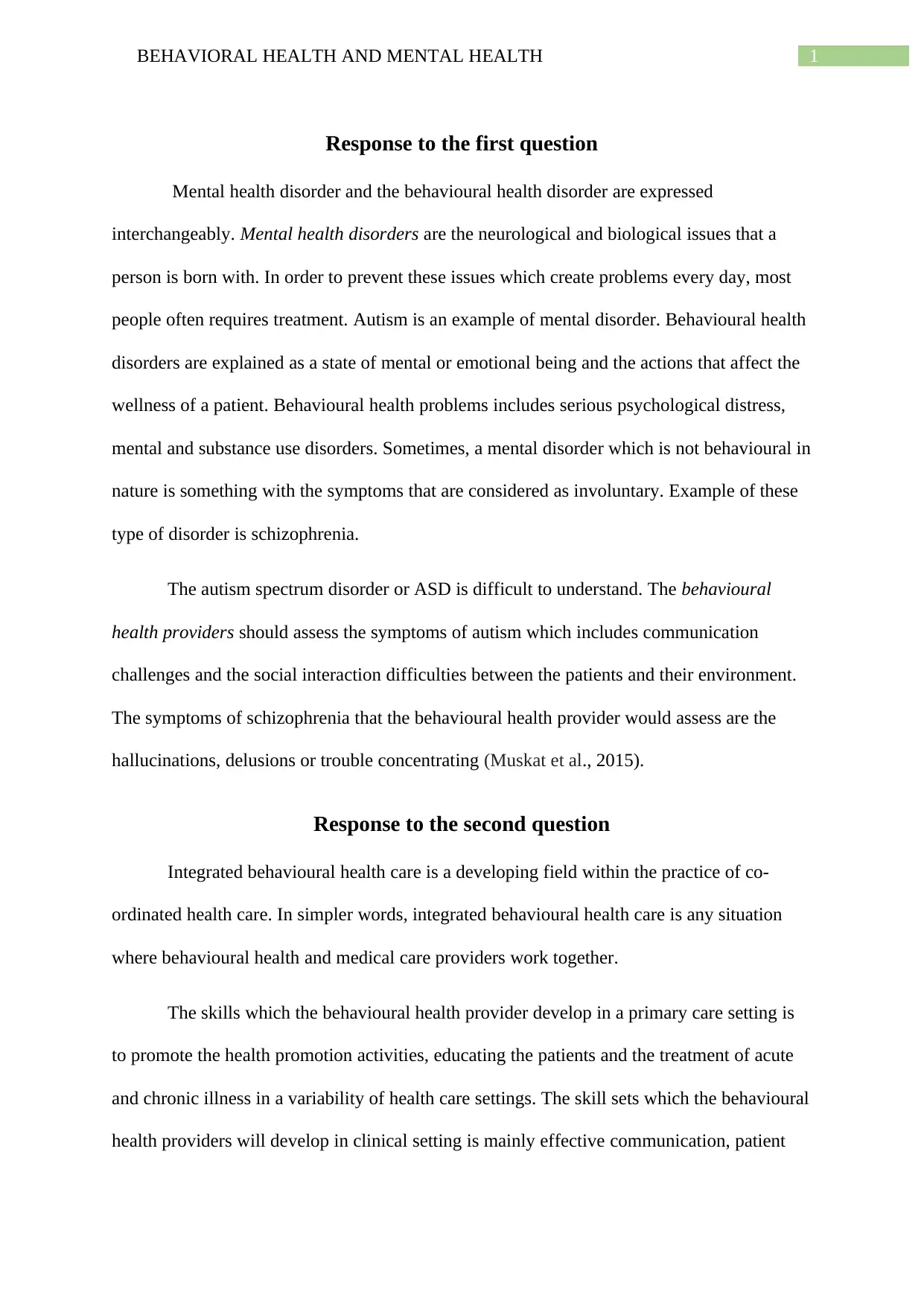
1BEHAVIORAL HEALTH AND MENTAL HEALTH
Response to the first question
Mental health disorder and the behavioural health disorder are expressed
interchangeably. Mental health disorders are the neurological and biological issues that a
person is born with. In order to prevent these issues which create problems every day, most
people often requires treatment. Autism is an example of mental disorder. Behavioural health
disorders are explained as a state of mental or emotional being and the actions that affect the
wellness of a patient. Behavioural health problems includes serious psychological distress,
mental and substance use disorders. Sometimes, a mental disorder which is not behavioural in
nature is something with the symptoms that are considered as involuntary. Example of these
type of disorder is schizophrenia.
The autism spectrum disorder or ASD is difficult to understand. The behavioural
health providers should assess the symptoms of autism which includes communication
challenges and the social interaction difficulties between the patients and their environment.
The symptoms of schizophrenia that the behavioural health provider would assess are the
hallucinations, delusions or trouble concentrating (Muskat et al., 2015).
Response to the second question
Integrated behavioural health care is a developing field within the practice of co-
ordinated health care. In simpler words, integrated behavioural health care is any situation
where behavioural health and medical care providers work together.
The skills which the behavioural health provider develop in a primary care setting is
to promote the health promotion activities, educating the patients and the treatment of acute
and chronic illness in a variability of health care settings. The skill sets which the behavioural
health providers will develop in clinical setting is mainly effective communication, patient
Response to the first question
Mental health disorder and the behavioural health disorder are expressed
interchangeably. Mental health disorders are the neurological and biological issues that a
person is born with. In order to prevent these issues which create problems every day, most
people often requires treatment. Autism is an example of mental disorder. Behavioural health
disorders are explained as a state of mental or emotional being and the actions that affect the
wellness of a patient. Behavioural health problems includes serious psychological distress,
mental and substance use disorders. Sometimes, a mental disorder which is not behavioural in
nature is something with the symptoms that are considered as involuntary. Example of these
type of disorder is schizophrenia.
The autism spectrum disorder or ASD is difficult to understand. The behavioural
health providers should assess the symptoms of autism which includes communication
challenges and the social interaction difficulties between the patients and their environment.
The symptoms of schizophrenia that the behavioural health provider would assess are the
hallucinations, delusions or trouble concentrating (Muskat et al., 2015).
Response to the second question
Integrated behavioural health care is a developing field within the practice of co-
ordinated health care. In simpler words, integrated behavioural health care is any situation
where behavioural health and medical care providers work together.
The skills which the behavioural health provider develop in a primary care setting is
to promote the health promotion activities, educating the patients and the treatment of acute
and chronic illness in a variability of health care settings. The skill sets which the behavioural
health providers will develop in clinical setting is mainly effective communication, patient
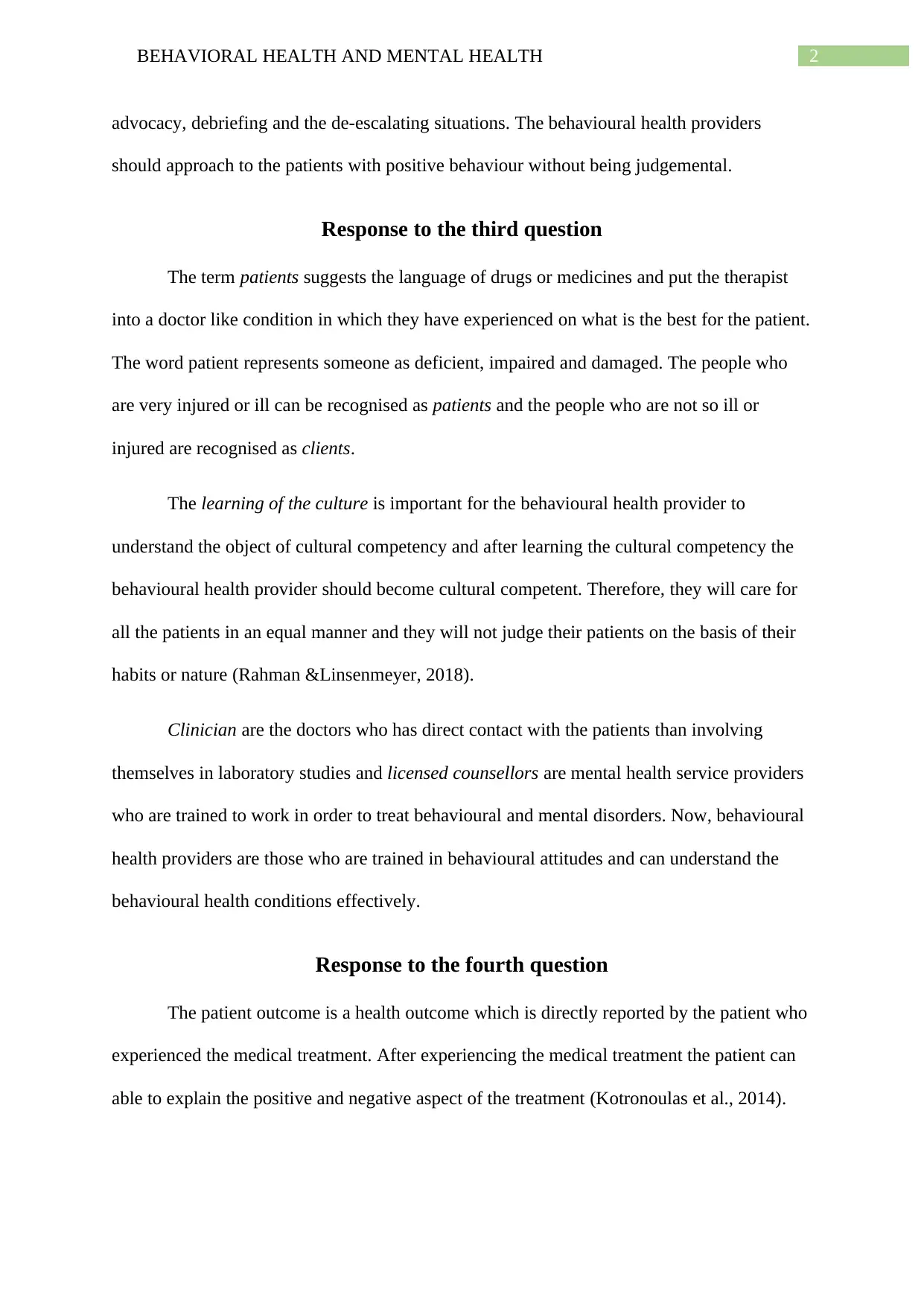
2BEHAVIORAL HEALTH AND MENTAL HEALTH
advocacy, debriefing and the de-escalating situations. The behavioural health providers
should approach to the patients with positive behaviour without being judgemental.
Response to the third question
The term patients suggests the language of drugs or medicines and put the therapist
into a doctor like condition in which they have experienced on what is the best for the patient.
The word patient represents someone as deficient, impaired and damaged. The people who
are very injured or ill can be recognised as patients and the people who are not so ill or
injured are recognised as clients.
The learning of the culture is important for the behavioural health provider to
understand the object of cultural competency and after learning the cultural competency the
behavioural health provider should become cultural competent. Therefore, they will care for
all the patients in an equal manner and they will not judge their patients on the basis of their
habits or nature (Rahman &Linsenmeyer, 2018).
Clinician are the doctors who has direct contact with the patients than involving
themselves in laboratory studies and licensed counsellors are mental health service providers
who are trained to work in order to treat behavioural and mental disorders. Now, behavioural
health providers are those who are trained in behavioural attitudes and can understand the
behavioural health conditions effectively.
Response to the fourth question
The patient outcome is a health outcome which is directly reported by the patient who
experienced the medical treatment. After experiencing the medical treatment the patient can
able to explain the positive and negative aspect of the treatment (Kotronoulas et al., 2014).
advocacy, debriefing and the de-escalating situations. The behavioural health providers
should approach to the patients with positive behaviour without being judgemental.
Response to the third question
The term patients suggests the language of drugs or medicines and put the therapist
into a doctor like condition in which they have experienced on what is the best for the patient.
The word patient represents someone as deficient, impaired and damaged. The people who
are very injured or ill can be recognised as patients and the people who are not so ill or
injured are recognised as clients.
The learning of the culture is important for the behavioural health provider to
understand the object of cultural competency and after learning the cultural competency the
behavioural health provider should become cultural competent. Therefore, they will care for
all the patients in an equal manner and they will not judge their patients on the basis of their
habits or nature (Rahman &Linsenmeyer, 2018).
Clinician are the doctors who has direct contact with the patients than involving
themselves in laboratory studies and licensed counsellors are mental health service providers
who are trained to work in order to treat behavioural and mental disorders. Now, behavioural
health providers are those who are trained in behavioural attitudes and can understand the
behavioural health conditions effectively.
Response to the fourth question
The patient outcome is a health outcome which is directly reported by the patient who
experienced the medical treatment. After experiencing the medical treatment the patient can
able to explain the positive and negative aspect of the treatment (Kotronoulas et al., 2014).
⊘ This is a preview!⊘
Do you want full access?
Subscribe today to unlock all pages.

Trusted by 1+ million students worldwide
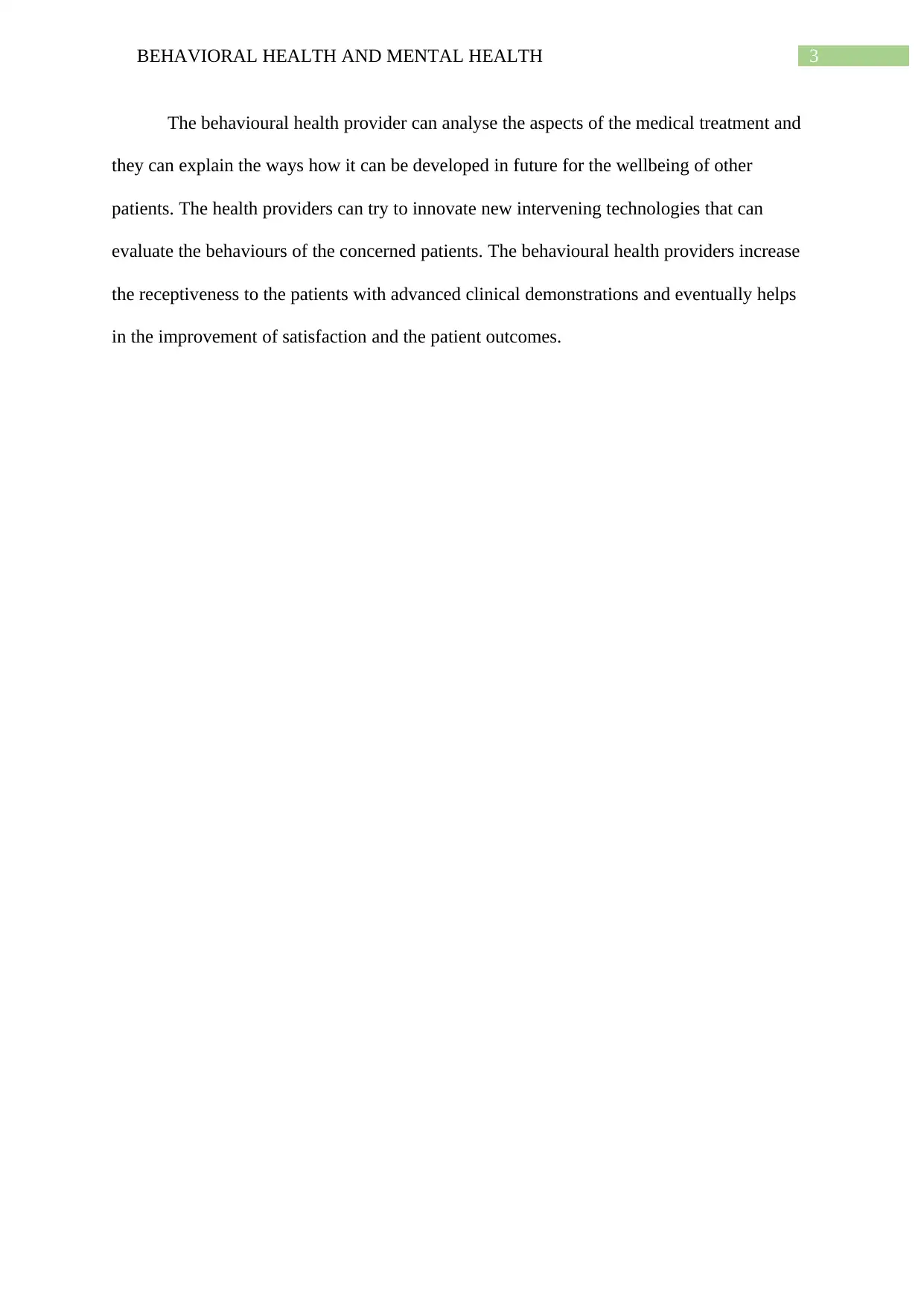
3BEHAVIORAL HEALTH AND MENTAL HEALTH
The behavioural health provider can analyse the aspects of the medical treatment and
they can explain the ways how it can be developed in future for the wellbeing of other
patients. The health providers can try to innovate new intervening technologies that can
evaluate the behaviours of the concerned patients. The behavioural health providers increase
the receptiveness to the patients with advanced clinical demonstrations and eventually helps
in the improvement of satisfaction and the patient outcomes.
The behavioural health provider can analyse the aspects of the medical treatment and
they can explain the ways how it can be developed in future for the wellbeing of other
patients. The health providers can try to innovate new intervening technologies that can
evaluate the behaviours of the concerned patients. The behavioural health providers increase
the receptiveness to the patients with advanced clinical demonstrations and eventually helps
in the improvement of satisfaction and the patient outcomes.
Paraphrase This Document
Need a fresh take? Get an instant paraphrase of this document with our AI Paraphraser
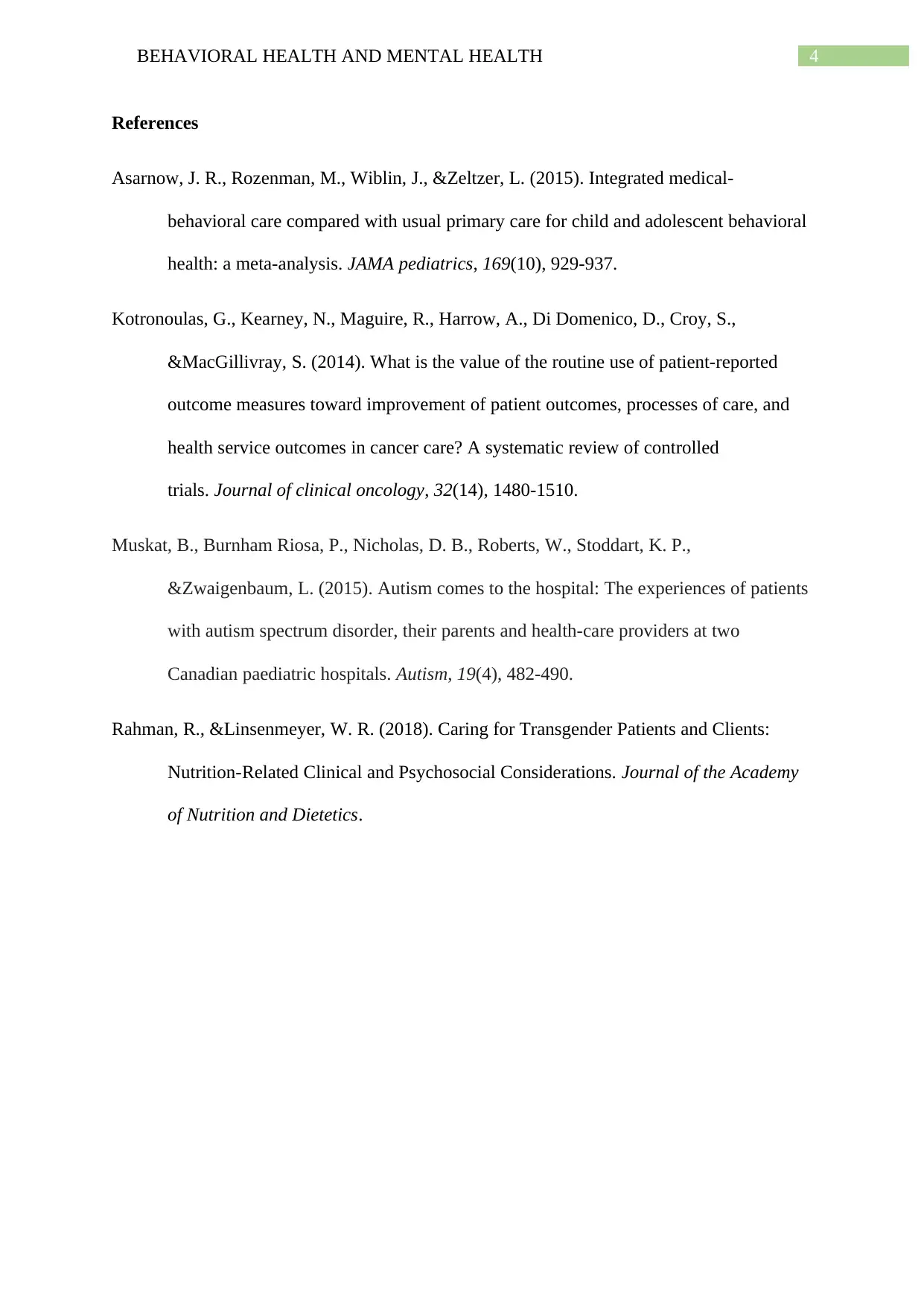
4BEHAVIORAL HEALTH AND MENTAL HEALTH
References
Asarnow, J. R., Rozenman, M., Wiblin, J., &Zeltzer, L. (2015). Integrated medical-
behavioral care compared with usual primary care for child and adolescent behavioral
health: a meta-analysis. JAMA pediatrics, 169(10), 929-937.
Kotronoulas, G., Kearney, N., Maguire, R., Harrow, A., Di Domenico, D., Croy, S.,
&MacGillivray, S. (2014). What is the value of the routine use of patient-reported
outcome measures toward improvement of patient outcomes, processes of care, and
health service outcomes in cancer care? A systematic review of controlled
trials. Journal of clinical oncology, 32(14), 1480-1510.
Muskat, B., Burnham Riosa, P., Nicholas, D. B., Roberts, W., Stoddart, K. P.,
&Zwaigenbaum, L. (2015). Autism comes to the hospital: The experiences of patients
with autism spectrum disorder, their parents and health-care providers at two
Canadian paediatric hospitals. Autism, 19(4), 482-490.
Rahman, R., &Linsenmeyer, W. R. (2018). Caring for Transgender Patients and Clients:
Nutrition-Related Clinical and Psychosocial Considerations. Journal of the Academy
of Nutrition and Dietetics.
References
Asarnow, J. R., Rozenman, M., Wiblin, J., &Zeltzer, L. (2015). Integrated medical-
behavioral care compared with usual primary care for child and adolescent behavioral
health: a meta-analysis. JAMA pediatrics, 169(10), 929-937.
Kotronoulas, G., Kearney, N., Maguire, R., Harrow, A., Di Domenico, D., Croy, S.,
&MacGillivray, S. (2014). What is the value of the routine use of patient-reported
outcome measures toward improvement of patient outcomes, processes of care, and
health service outcomes in cancer care? A systematic review of controlled
trials. Journal of clinical oncology, 32(14), 1480-1510.
Muskat, B., Burnham Riosa, P., Nicholas, D. B., Roberts, W., Stoddart, K. P.,
&Zwaigenbaum, L. (2015). Autism comes to the hospital: The experiences of patients
with autism spectrum disorder, their parents and health-care providers at two
Canadian paediatric hospitals. Autism, 19(4), 482-490.
Rahman, R., &Linsenmeyer, W. R. (2018). Caring for Transgender Patients and Clients:
Nutrition-Related Clinical and Psychosocial Considerations. Journal of the Academy
of Nutrition and Dietetics.
1 out of 5
Related Documents
Your All-in-One AI-Powered Toolkit for Academic Success.
+13062052269
info@desklib.com
Available 24*7 on WhatsApp / Email
![[object Object]](/_next/static/media/star-bottom.7253800d.svg)
Unlock your academic potential
Copyright © 2020–2026 A2Z Services. All Rights Reserved. Developed and managed by ZUCOL.





